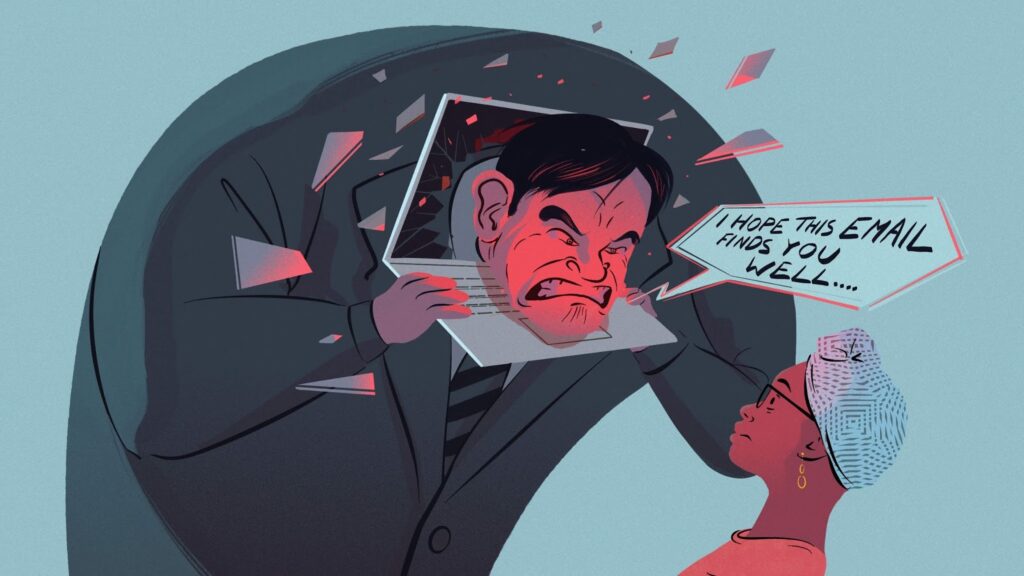Ever felt like the star of your own show as a freelancer? The concept of “main character syndrome” hit the zeitgeist this year when TikTokkers went viral with curated footage to make them look like the protagonist of their own life. While we are all arguably the main characters of our own lives, this trend spotlighted how much we want to be in charge of our own narratives.
But when it comes to being a freelancer, self-employed, a sole trader – somebody who runs the show that is their own career and income – we’re all the main characters of our own working life story.
When you’re established enough (and I must stress that this is a big factor in being a “main character” of your own working life), you are able to pitch and work on ideas that you are passionate about, work the hours that you deem most conducive to productivity and fit in other areas of your own life more easily, without the middle man of an employer to scupper your plans.
Centring yourself – as well as your personal needs and interests – into your routine, as well as your conception of your job and career goals means that your working life follows your own script and narrative.
For Maisie, a freelance writer and PR consultant, being the “main character” has been a very positive experience. “As a freelancer, I can express myself more, as well as design my own day and schedule,” she says. “When you’re ‘employed’, you have to shape your personal brand to fit that particular company, and so much of your day is made up of what your employees and colleagues are doing. Whereas when you’re freelance, you can shape it according to what you’re interested in and how you want the world to see you.”
It’s a romantic notion. But what happens when that romanticism morphs into an unwanted pressure to be the main character of your own work? Anya, a freelance editor and journalist, tells me that a lot of her successful freelance experiences have come from being encouraged to put perhaps too much of herself into her work. “This element of being the ‘main character’ can be really difficult to navigate,” she says.
“Being the mistress or master of your own destiny in your work can play really strongly to the kind of values that I see in a lot of freelancers, including self determination and creativity,” career coach Rachel Schofield tells me, “But this can over-amplify the need for your voice and your leadership, which can be isolating and disempowering.”
When it comes to navigating how personal your freelance efforts need to be, she advises taking the time to create clear boundaries with yourself about what you are and are not willing to share, whether that’s your personal time or personal experiences to bolster a creative writing project. It’s a hard thing to do, but once the boundaries are there you might feel more comfortable communicating them to others.
Social media is another tool used by many freelancers to build their brand and presence, and is undeniably a means of feeling like the “main character” in the story you are creating for your business. “Everyone in the freelance community is playing a certain role on social media, particularly Twitter,” Maisie says. Likes, comments, engagement and creating a following are a really useful way of charting what audiences and customers want from you, and a way to showcase your work – but the dopamine hit that comes with it makes any success or failure online feel personal.
Playing this character online is also a way of giving you personal validation, as the individual most invested in your business and what it creates. Chrissy, founder and face of wine bar and coffee shop BookBar, tells me how her business’ social media presence is undoubtedly linked with her own self worth. “When something’s not doing so well or happening as you want on social media – or in other areas of the business – it can really get under your skin and it is emotionally affecting,” she says. “When your business is so entwined with who you are, and your character, I’ve found it can be damaging to your productivity and your mental health.”
Rachel advises being mindful of the pressure to “perform” on social media as the main character, instead recommending to only share what you’d be happy chatting about in the office cafeteria, as part of a wider team and not the main character. Instead of using social media as the online version of an appraisal you might have as an employed worker, centring your usage around other people’s approval, she recommends trying to use it to finetune your own message and mission instead.
While working for yourself is a liberating experience, it can make working with others seem disorientating. Anya tells me that working on group projects can be challenging, as she is used to being the “main character” in the work she is doing. “I just recorded a travel podcast with a group, and found it hard not being able to get on with it myself, with my own ideas and schedule,” she says, admitting this isn’t a great feeling.The key here, Rachel says, is to be really tuned in with your strengths and weaknesses in your work. Once you know this, you’ll be less privy to trying to play all “roles”, and more focussed on seeking out the skills of others to help with things you’re less confident doing. “It’s also important to choose to work with people whose values align with yours,” she says, as you will feel much more like a member of a supporting cast if you really feel that you’re working towards a common goal.
Challenges aside, though, Maisie feels that the way the world of work has changed over the last year and half has helped freelancers to continue to centre what they need first, without feeling too isolated. “The normalisation of working from home across the board has meant that it’s even more important to feel happy in your work, and make yourself the main character, as you might be doing it alone or away from an office environment more often anyway,” she says. “I think that the wrong ‘employed’ role in a creative industry can be just as, if not more, isolating because you’re not always working with your own goals in mind.”
Above all, even though being the main character is thrilling, acting alongside a stellar supporting cast is super important in creating the most compelling of performances. Bonne chance!




